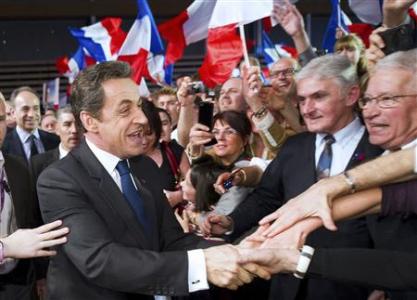(Reuters) – To a visitor from Mars, France’s presidential election must seem a bizarre contest between candidates waging largely artificial battles with Europe before an electorate of economic illiterates.

President Nicolas Sarkozy boasts of having saved the euro and turned the corner in the currency area’s sovereign debt crisis (with a little help from German Chancellor Angela Merkel) despite losing France’s top-grade credit rating.
Sarkozy won plaudits for his activist handling of France’s European Union presidency in 2008 when he led the EU’s response to the global financial crisis and mediated an end to a brief war between Russia and Georgia.
But the conservative leader has just whipped up two conflicts with “Brussels”, over border controls and trade, in an apparent bid to claw back voters from far-right anti-immigration candidate Marine Le Pen, who advocates leaving the euro.
In what would be breaches of European treaties, Sarkozy threatened last week to pull France out of the Schengen zone of passport-free travel in Europe and to erect unilateral trade barriers unless he gets his way on stricter controls on migrants and on unfair competition in public procurement.
In reality, negotiations to reform the Schengen system are already well advanced, and the European Commission is working on proposals to force greater reciprocity in access to public tenders. So Sarkozy can reap the electoral benefits of sounding tough without much risk of having to carry out his threats.
His main challenger, Socialist Francois Hollande, has vowed not to ratify a treaty on tougher budget discipline signed by 25 European states unless Germany and other partners agree to add measures to promote growth and jobs.
“It’s a strange campaign when some want to renegotiate a treaty that has already been signed while others want to leave treaties that are already in force,” said a senior European Union official, shrugging off the French electioneering.
BUY EUROPEAN
While Sarkozy demands a U.S.-style ‘Buy European’ Act, the Socialist program calls for a form of European protectionism, with extra tariffs on imports from countries that do not meet EU safety, labor and environmental standards.
Advisers to both camps say the candidates have sharpened their tone to appeal to the majority of voters who rejected the EU’s constitutional treaty in a 2005 referendum. Many of those electors are now leaning towards Le Pen or hard-left firebrand Jean-Luc Melenchon.
France’s attitude to Europe is riddled with paradoxes. The French see themselves as founders and leaders of the European project, yet many dislike the free trade, unfettered competition and open borders the EU enshrines.
Many also remain uncomfortable with the EU’s eastward enlargement over the last decade, which they believe has diluted French influence and undermined their generous but expensive social model through cheap competition.
Sarkozy has laced recent speeches with swipes at “Brussels technocrats and tribunals”, insisting that national governments must be in charge of running Europe’s economic and immigration policies.
Hollande too, although on the pro-European wing of the Socialist Party and close to former European Commission President Jacques Delors, has stepped up talk of defending French interests and parliamentary sovereignty.
“I have decided to change the direction of Europe,” he said at a meeting with European centre-left leaders including German Social Democratic Party chairman Sigmar Gabriel at the weekend.
Pledging to renegotiate the fiscal compact impelled by conservative German Chancellor Angela Merkel, Hollande said: “This treaty is an illusion and it poses a risk … It creates the conditions for lasting economic crisis which would only reproduce budgetary imbalances.”
He also urged widening the European Central Bank’s mandate to include promoting growth – a non-starter for Germany – and favors common European bonds to finance investment in the energy sector, education and urban development.
Senior European officials say the treaty cannot be reopened and that the most Hollande can realistically expect is a separate EU action plan to promote growth and jobs.
NOT CREDIBLE
A majority of voters polled by the CSA institute say neither likely finalist is economically credible. But in a country where economics is regarded as secondary to politics, it doesn’t seem to matter much.
Public spending has risen during Sarkozy’s five-year term, to 56.6 percent of gross domestic product in 2011, the second highest in the European Union after Denmark. But neither candidate is talking seriously about cutting state expenditure.
Instead, they are focusing mostly on ways of increasing revenue, in a country where the total tax take is already equivalent to 50.8 percent of economic output.
Both are vying to slap punitive taxes on the rich, with Hollande proposing a 75 percent top tax rate on income over 1 million euros ($1.3 million) a year, and Sarkozy promising to make French tax exiles declare and pay tax on their worldwide investment income to Paris.
Both are committed to reducing France’s public deficit to 3 percent of GDP in 2013 from 5.3 percent last year. That implies a sharp cut in public spending next year, especially if growth remains sluggish, but neither is keen to discuss that.
The independent Institute Montaigne public policy think-tank said in an audit that Hollande’s numbers don’t add up because he has overestimated future revenue by 15 percent. Sarkozy has yet to present a detailed program that could be audited.
While neighbors such as Germany, Italy and Spain have adopted or are enacting far-reaching structural reforms to pension, labor market and welfare systems, France has been far more cautious for fear of social unrest.
Sarkozy did raise the minimum retirement age to 62 from 60, facing down weeks of strikes and protests. He is now belatedly planning to reduce labor costs by shifting the burden of welfare costs from payroll deductions to VAT sales tax.
Hollande has vowed to scrap that change if he wins, and partially reverse the pension reform to enable people who started work at 18 or younger to retire at 60.
Many French and European officials say privately that whoever wins on May 6 will have to make more radical budget cuts and structural reforms than either candidate is admitting. By keeping that inconvenient truth secret until after polling day, France’s leaders are storing up trouble for themselves.
(Editing by Catherine Evans)



